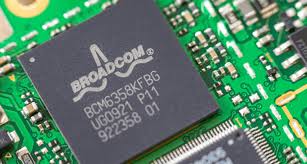The chipmaker’s announcement of a massive $10 billion AI chip order from a new customer fueled excitement about Broadcom’s potential to profit from the generative AI race, causing its shares to rise 11% in premarket trade on Friday.
Amid Big Tech’s efforts to expand beyond Nvidia’s, the transaction reaffirms the company’s position as a top supplier of bespoke chips. It introduces new, expensive, and limited-supply artificial intelligence processors.
Analysts at BofA Securities stated, “We think the AI pie could just be getting bigger, even though we agree Broadcom is taking more share.”
Investor confidence in the AI boom, which has appeared to be faltering this year, may be bolstered by the latest chip order.
After more than doubling in value last year, Broadcom’s shares are up 32% this year.
The chipmaker crossed the trillion-dollar valuation last year, and if premarket advances continue, it will increase its market worth by more than $160 billion to $1.44 trillion.
The new transaction from Broadcom has stoked rumors that the unidentified client is OpenAI.
The timing and magnitude of the transaction indicate that OpenAI is most likely the new client, according to analysts at J.P. Morgan, Bernstein, and Morgan Stanley.
Last year, it was revealed that OpenAI and Broadcom were collaborating to create the company’s first proprietary microprocessor.
Although Broadcom does not specify which cloud businesses it is creating custom chips for, analysts think that among its current clients are Facebook-owned Meta Platforms and Alphabet’s Google.
According to Bernstein analysts, the acquisition of this new client could boost AI sales in fiscal 2026 from the $30 billion predicted in the previous quarter to well over $40 billion.
According to Broadcom, the company anticipates “significantly improved” growth in AI revenue in the fiscal year 2026.
CEO Hock Tan’s announcement that he will continue to lead for at least five more years added to the momentum.
Tan, who has been in charge of the chipmaker for almost 20 years and guided it to the forefront of the AI revolution, was 73 years old as of Broadcom’s March proxy filing.

















